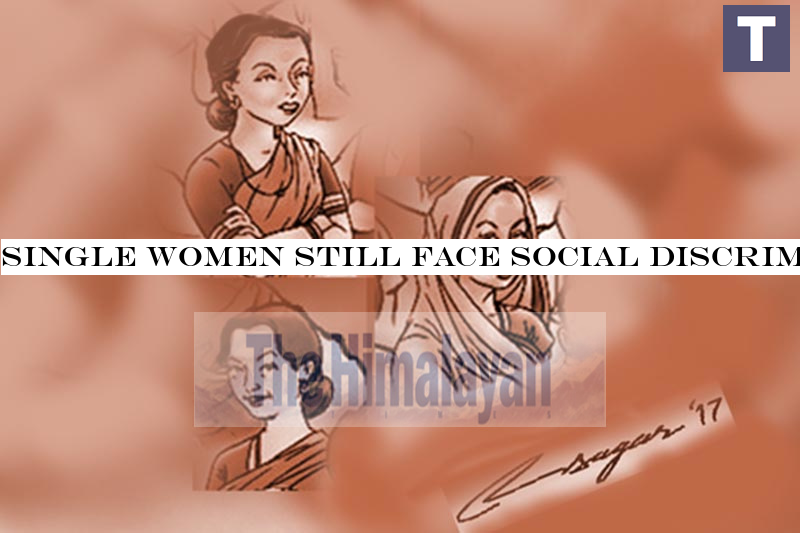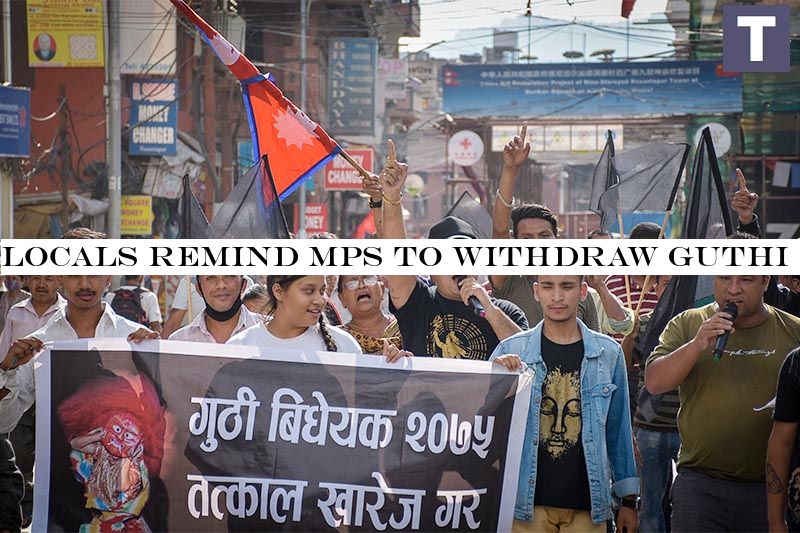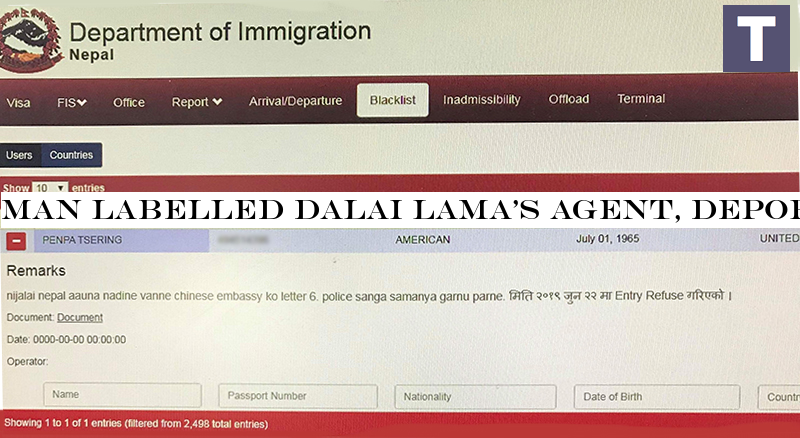Music
Trailers
DailyVideos
India
Pakistan
Afghanistan
Bangladesh
Srilanka
Nepal
Thailand
StockMarket
Business
Technology
Startup
Trending Videos
Coupons
Football
Search
Download App in Playstore
Download App
Best Collections
Nepal
Deteriorating press freedom in Nepal has drawn the attention of international press bodies
Kathmandu, June 24
Chairperson of the National Human Rights Commission Anup Raj Sharma said that journalists should not face criminal case for doing their jobs.
Interacting with civil society members and editors at a programme organised by NHRC here today, Sharma said the government was wrongly invoking ‘reasonable restriction& provisions to propose jail term for journalists in some of the new bills, including the Media Council Bill. &These bills violate freedom of expression guaranteed by the constitution,& he said.
Civil society members and media professionals have criticised provisions of Nepal Media Council Bill, Information Technology Bill and Advertisement Bill, saying those provisions will curtail freedom of expression.
Sharma said the Supreme Court had already set a precedent in a case that the Attorney General could not override the recommendation of the NHRC and yet the government brought the NHRC Act (Amendment) Bill proposing to give discretionary powers to the AG on whether or not cases should be filed in the court as per the recommendations of the NHRC.
Sharma said the SC had given its reason for denying the AG discretionary powers saying the AG, being a political appointee could easily succumb to the prime ministerpressure and not act upon the NHRC recommendations. He said the governmentargument that the AG was the final authority to take a call on whether a criminal case had to be filed in the court or not was wrong as the Commission for the Investigation of Abuse of Authority and the Judicial Council themselves filed cases in the court.
The law says that the AG can decide whether or not a case has to be filed in the court unless otherwise provisioned in the law and that means the AG did not have power to claim jurisdiction over all cases, Sharma argued.
Sharma said there was a risk of restrictive provisions getting parliamentary legitimacy as the government had overwhelming majority in the House.
If other institutions cannot check the executiveexcesses, then bills that propose to curtail peoplepower may get endorsed by the House, he argued.
Acting President of Federation of Nepali Journalists Bipul Pokhrel said the FNJ was committed to protecting press freedom as provisioned in the constitution. &The Nepali press cannot settle for less freedom,& he said, adding that the FNJ would continue to agitate against the restrictive provisions of new bills.
Pokhrel said that if these bills were passed, people could be jailed for accidentally pressing a wrong key on their smartphones.
He said the government was not in favour of finding negotiated settlements of issues.
Senior journalist Yubaraj Ghimire said that journalists were facing the sword of Damocles as the government was wrongly invoking ‘reasonable restriction& provisions. He said the NHRC and FNJ should have principled commitment to defend each othercauses as their struggle was important to protect and promote human rights.
Another senior journalist Harihar Birahi said deteriorating press freedom in Nepal had drawn the attention of the international press bodies and soon those bodies could visit Nepal to assess the situation here. He said there was a risk of the government becoming tyrannical.
Executive Director of Freedom Forum Taranath Dahal said the government had boasted in international fora about its record on human rights, women rights and inclusion, but the recent bills had exposed the governmentill intentions. He said the government was wrongly interpreting ‘reasonable restrictions& to propose restrictive provisions in new laws.
The post ‘Govt invoking reasonable restriction provision to curtail press freedom& appeared first on The Himalayan Times.
- Details
- Category: Nepal
Read more: ‘Govt invoking reasonable restriction provision to curtail press freedom’
Write comment (98 Comments)Kathmandu, June 24
Mala Devi Jaiswal, 42, a resident of Rautahat, could not take part in her daughtermarriage ceremony rituals. She was told her participation would be ‘inauspicious& because she happened to be a widow.
&I felt bad and discriminated yet I couldn&t say anything,& said Jaiswal.

In patriarchal Nepali society, where women are still fighting for equal rights, a woman who has lost her husband faces even more discrimination. The oppressive social norms bar widows from wearing whatever she likes: Red-coloured clothes are a big ‘no&. She cannot move freely, take part in religious ceremonies or remarry. A widow also faces difficulty in claiming her husbandproperty and is taunted by in-laws as she is blamed for her husbanddeath.
Sakuntala Yadav, 39, a resident of Siraha, whose husband disappeared 14 years ago, has raised two children on her own since then. For her childrenfurther studies she needs money. But she has not been able to claim her husbandproperty. &I fear my younger son won&t be able to get his citizenship if I ask for my share of property from the in-laws,& she said.
Yadav had to produce 25 villagers as witnesses before the local authority to enable her elder son to get a citizenship. Now, her younger son has become eligible for citizenship. But in Nepal, only a father or his family members have to be present at the ward and district offices to get the document. &If I take legal recourse to get my share of property, my in-laws will trouble me when my child initiates the process of obtaining citizenship,& she said.
In-laws of most of widows use lack of financial acumen and chances of misuse of assets as pretexts to deny property rights to single women. But in reality, property is generally used as a bargaining tool to provide citizenships to their offspring.
&My son probably would not have received his citizenship certificate had it not been for my brother in-law,& said Sashi Devi Bhatta, a resident of Dharmasthali, Kathmandu, who lost her husband 19 years ago.
Nepal has seen significant political changes over the years and participation of women has gone up in the Parliament as well government offices. But rigid social structures have not changed.
Yadav, for example, has faced allegations of ‘having an affair& simply because he has held conversations with men.
&It is sad that we are sometimes not treated as human beings. People often use harsh words and some of the men even follow us and sexually harass us,& said Sita Shrestha, a resident of Janakpur, who lost her husband 11 years ago.
Shrestha once had to hit a man who misbehaved with her when she was returning home from the workplace with her daughter. &It is very difficult to protect your children, especially girls, if you are a single woman,& said Shrestha, a mother of six daughters.
Single women are still barred from vital registration. There is no ownership of property. They are economically dependent. The government has to bring pragmatic programmes that would improve the lot of women at the grassroots level to help them become independent, said Lily Thapa, founder of Women for Human Rights.
The post Single women still face social discrimination appeared first on The Himalayan Times.
- Details
- Category: Nepal
Read more: Single women still face social discrimination
Write comment (94 Comments)Kathmandu, June 24
Kathmanduties might not take noise pollution as an issue of concern amidst more alarming pollutions such as air and water, but noise pollution is growing at an alarming rate with the pollution limits exceeding in most of the places inside Kathmandu valley.
A report prepared by Environment Statistics of Nepal 2019 shows that areas with heavy traffic, commercial-cum-residential areas and industrial areas inside Kathmandu valley have exceeded the noise pollution limit set by the World Health Organisation.
Noise pollution is the propagation of noise with harmful impact on human activity or animal life. Noise pollution is measured in decibel (dBA) unit. According to the WHO, continuous exposure to noise pollution with more than 90 dBA could cause hearing problems and adversely affect the nervous system.
The WHO has set limit of 70 dBA in ‘High Traffic Area&. The government research based on 11 such areas shows that only three cities had noise pollution between 65 to 70 dBA. Majority of such places such as Kalanki, Putalisadak, Maitighar, Kupondol and Suryabinayak had exceeded the limit both in the night and day time.
Similar picture was seen in ‘Commercial-Cum-Residence Area& such as Asan, Naya Bazaar and Manbhawan where the research was conducted. The WHO limit for such areas is 64 dBA, all these areas have exceeded the limit, reaching up to 74 dBA at day time in Asan Chowk. The research conducted at various industrial areas such as Balaju Yantra Shala, Balaju Industrial Area and Patan Industrial Gate showed that all the areas exceeded the 70dBa limit. Balaju Industrial area had recorded noise pollution up to 78 dBA in the day time.
While, the government lacks control mechanism to bring down the noise pollution level, out of 4,076 industries across the country only 1.6 per cent had installed equipment to control sound pollution. These industries were divided into 19 sub-categories such as textile, food and beverage, wood products, tobacco, paper and so on. Doctors suggest that exposure to loud noise for a long time can cause permanent hearing loss besides other mental and physical disorders.
ENT specialist Dr Mira Bista said extreme noise pollution could cause various ailments such as sleep disturbance, hypertension and high blood pressure.
The post Noise pollution alarming in Kathmandu appeared first on The Himalayan Times.
- Details
- Category: Nepal
Read more: Noise pollution alarming in Kathmandu
Write comment (100 Comments)Kathmandu, June 24
Locals of Kathmandu, Bhaktapur and Lalitpur districts staged a demonstration today evening reminding the lawmakers to withdraw the Guthi Bill registered in the National Assembly.
The National Assembly meeting is scheduled to be held tomorrow.

The locals, especially people of Newar community, have been demanding that the bill should be scrapped. According to locals, the bill aims to change the operation modality and ownership structure of guthis, which, many say, will pave the way for the land mafia to make hay.
Following widespread protests and criticism against the bill, Minister of Land Management, Cooperatives and Poverty Alleviation Padma Kumari Aryal, at a press meet on June 18, had said that the ministry had decided to withdraw the bill. The controversial Guthi Bill was registered in the National Assembly on April 30.
The locals, however, have been casting doubts that the lawmakers might again move the bill ahead since it has not been formally withdrawn from the House.
Locals of Basantapur, Mangal Bazaar, Thimi, Saakhu, Balaju, Tokha and Bungmati, among other old Newari settlements, took to the streets today warning the government against any kind of cheating.
Ganapati Lal Shrestha, a conservation activist, said, &The government should not try to deceive people with fake promises. If the lawmakers fail to withdraw the Guthi Bill, they should be ready to face consequences.&
Locals have warned that if the government does not withdraw the bill, they will launch stringent protests in the coming days. Locals have also demanded that the new draft of the bill should be prepared since the current laws for regulating guthis are also not complete. &We demand that the government seek suggestions from stakeholders, guthiyars (trustees), and locals while drafting the new bill,& Shrestha said.
Thousands of people from the Newar community, despite the governmentwithdrawal of the controversial Guthi Bill on June 19, had gathered at Maitighar Mandala in a show of strength protest.
The post Locals remind MPs to withdraw Guthi Bill appeared first on The Himalayan Times.
- Details
- Category: Nepal
Read more: Locals remind MPs to withdraw Guthi Bill
Write comment (95 Comments)Kathmandu, June 24
The Supreme Court refused to continue the stay order passed by it earlier in a writ petition filed by the Ajeya Raj Sumargi-owned Nepal Satellite Telecom.
His company had field a writ petition against revised amount of capital tax gains on the sale of its shares.
Todayorder was passed by a division bench of justices Sushmalata Mathema and Manoj Kumar Sharma.
This means that the government can now collect tax from Sumargicompany.
Satellite Telecom Pvt Ltd had filed a writ petition on April 24 seeking repeal of revised tax. Cyprus based Airbell Services Ltd had bought 75 per cent shares of the company for which the government sought Rs 4.31 revised tax from Nepal Satellite Telecom.
On May 16, a single bench of Justice Bam Kumar Shrestha had told the government to keep its decision to collect revised tax from Nepal Satellite Telecom on hold.
The division bench of the SC observed that since a notice of revised tax had already been issued on May 14 and since written replies had already been submitted by the case parties, there was no need to issue interim order as demanded by the petitioner.
The apex court also said that the issues raised by the petitioner would be settled in the final hearing.
The post SC refuses to continue stay order in NST case appeared first on The Himalayan Times.
- Details
- Category: Nepal
Read more: SC refuses to continue stay order in NST case
Write comment (92 Comments)Kathmandu, June 24
Immigration authorities at the countrysole international airport have refused to let an American tourist enter Nepal on suspicion of being an agent of the exiled Tibetan Buddhist leader the Dalai Lama, according to sources.

Penpa Tsering, 53, who arrived at Tribhuvan International Airport from New York city via New Delhi on Saturday, was denied entry into Nepal and was deported to the US after hours of questioning at the airport.
The tourist holding US passport was scorned and mistreated because of his Tibetan origin, eyewitnesses told THT. &Authorities decided to deport him after questioning harshly for hours.&
Penpa was sent back to the US after immigration officials found out that in their records a man by his name was the ‘most-wanted& person by China. &We acted at the request of the Chinese Embassy in Kathmandu,& an official said. Penpa, however, requested immigration desk officers to let him visit Nepal as he wanted to reunite with his friends and relatives in Kathmandu.
According to the official, the Chinese Embassy had written to the Ministry of Foreign Affairs to restrict a person named ‘Penpa Tsering& from entering Nepal labelling him a campaigner of the free Tibet movement ,as well as a strong advocate of Tibetexiled spiritual leader. China also feared that a person with the name of ‘Penpa Tsering& could accelerate Tibetans& movement against China in Nepal, he added.
They sent him back to the US via Doha on Saturday evening.
The officials, who believed that their action aimed at honouring Nepalone-China policy, however, were not sure whether the same person was wanted by China. &After consulting higher authorities, including Home Minister Ram Bahadur Thapa, we simply chose to be on the safe side by deporting him to the US,& another official said.
Penpa, who repeatedly denied his affiliation to the Dalai Lama during questioning, had already obtained a multiple-entry visa from India for 10 years, an officer who read PenpaUS passport data, said.
He claimed that Penpa had visited Kathmandu for three days in 2013 also.
Kumar Bahadur Khadka, chief immigration officer at TIA, confirmed Penpadeportation but refused to share more information about the incident. Immigration officials can take such action against anyone whose name is in the blacklist, Eshor Raj Poudel, director general at the Department of Immigration, said. &In Penpacase, I don&t have more details to share,& he added.
The 2018 Country Reports on Human Rights Practices released recently by the US Department of State mentioned that Nepal, which does not recognise Tibetans who arrived in the country after 1990 as refugees, continued its attempts to stop them from celebrating culturally important events, such as Tibetan New Year, World Peace Day and the Dalai Lamabirthday.
The government has not issued personal identification documents to Tibetan refugees in more than 20 years, leaving majority of this refugee population without recourse to present required documents at police checkpoints or during police stops, adds the report.
The post Man labelled Dalai Lamaagent, deported to US appeared first on The Himalayan Times.
- Details
- Category: Nepal
Read more: Man labelled Dalai Lama’s agent, deported to US
Write comment (93 Comments)Page 1462 of 1592

 5
5





